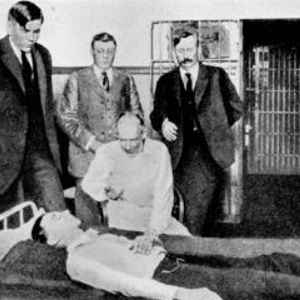 (source)
(source)
|
Robert Ernest House
(3 Aug 1875 - 15 Jul 1930)
American physician who championed the use of scopolamine hydrobromide in criminology, which became known as a “truth serum.”
|
‘Truth Serum’ Involves Five in Axe Murders, Clearing Up 44 Crimes in Birmingham, Ala.
The headline above appeared with a dateline of “BIRMINGHAM, Ala., Jan. 7,” on the front page of the Tuesday, January 8, 1924, issue of the New York Times. The article concerned the preparations for the early trial of “five negroes” held responsible for a wave of axe murders in Birmingham, that were committed during the past three years. The men were reported as having confessed to causing eight of those deadly assaults, and had been indicted on charges of murder.
The article noted that it had been announced that the confessions were made “while under the influence of a ‘truth serum’” but these were also corroborated by “the confessions after they came from under its influence.” The specific drug used as the truth serum was not identified in the report.
Apparently, the motive was robbery, and the choice of who would be the murderer from their group was made by drawing straws.
The men being held under arrest were identified by Solictor James G. Davis of the Jefferson County Circuit Court, as the “syndicate” he believed had carried out all the forty-four attacks that resulted in twenty-four deaths in the “axe murder” carnage.
Three more members of the gang, including the alleged leader, were still uncaptured, but “special officers” were in pursuit of them in Central Alabama.
- Science Quotes by Robert Ernest House.
- 3 Aug - short biography, births, deaths and events on date of House's birth.
- 'Truth Serum' Test Proves Its Power - reported in New York Times (22 Oct 1924).
- Robert House, The Use Of Scopolamine In Criminology - Paper published in 1922.
- Birmingham Axe Murders - more details on the names of those killed or wounded, and by whom.





